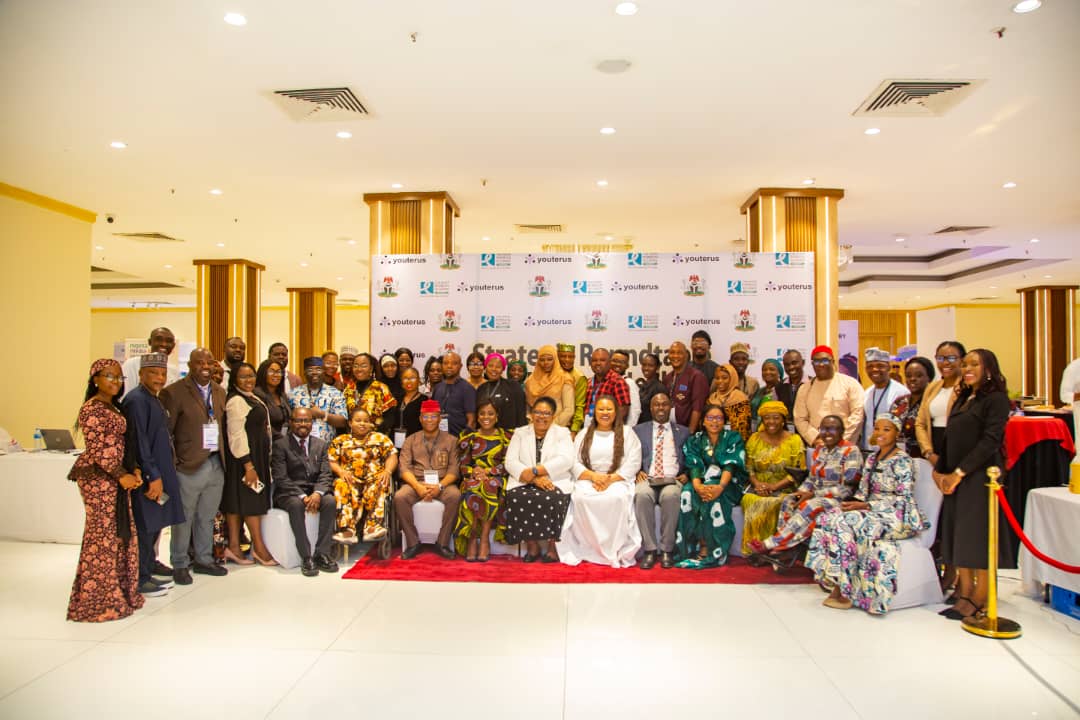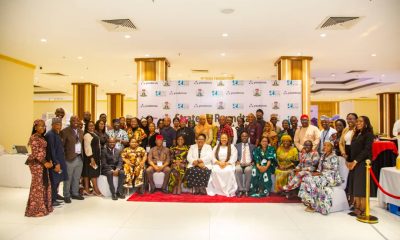NEWS
Lalong Relaxes Plateau Lockdown by Five Days

From Jude Dangwam, Jos
Governor Simon Lalong of Plateau State has relaxed the one week COVID-19 lockdown by five days beginning from 11.00PM of Thursday April 15, 2020 to Sunday Midnight April 19, 2020 for citizens of the state to restock their homes with food among other needs that can take them for another one week lockdown.
He said the state has investigated 99 cases and has currently isolated 23 persons who are being observed because they came in from other States with confirmed cases of the disease out of which 23 persons isolated none has so far shown any symptoms.
Lalong stated this during a state broadcast on the end of a one week lockdown held at the old government house Rayfield in Jos the Plateau State capital.
He disclosed that over 1242 violators were arrested and made to pay fined by the COVID-19 Mobile Court established in the state out of which 195 were sentence to community services by clearning drainages under the monitoring of personnel of the Nigerian Correctional Service.
The Governor said farmers, particularly those in the rural areas are exempted from the restrictions, as they are required to go to their farms now that the rains have started but must however, observe all guidelines for social distancing and hygiene.
The five days relaxation goes with the earlier restriction prior to the total lockdown where all markets remained closed except those selling “food items, pharmaceuticals and cooking gas.”
He stressed that “all illegal street trading, street hawking, begging are prohibited. The illegal Sunday markets on Ahmadu Bello Way, Bukuru and environs remain banned. Social joints, Nightclubs, drinking parlours are to remain closed, while restaurants are advised to prepare take away for their customers to avoid crowding.
“Motor parks are to capture and keep data including contacts of all inbound and outbound passengers as well as adhere strictly to social distancing and mass gathering prohibition order as well as hygiene regulations.
“Vehicles (Keke Napep, Cars and Buses) are to abide by restriction on the number of passenger to carry, which have been spelled out as 1, 4 and 6 respectively. Places of worship are to strictly adhere to the 50 persons provision, while maintaining social distancing and hygiene regulations. The ban on all anniversaries and cultural festivals remains in force.”
For the Governor, despite all the challenges and pains he can confidently say that the lockdown has been a huge success. “As at today, we have investigated 99 cases and currently isolated 23 persons who are being observed because they came in from other States with confirmed cases of the disease. Of the 23 persons isolated, none has so far shown any symptoms.
“I am happy to announce that the Testing Centre for Plateau State earlier envisaged has finally come to fruition, as the Bio-Safety Level 3 Grade 1 Laboratory at the National Veterinary Research Institute (NVRI) Vom, has been equipped and certified by the National Centre for Disease Control (NCDC) to begin outright test for COVID-19,” adding that the lab has the capacity of carrying out 1000 test at once.
He also disclosed that Government has constituted a committee headed by the Deputy Governor, Prof. Sonni Gwanle Tyoden and directed to immediately commence the distribution of palliatives to the most vulnerable and weak amongst citizens of the state.
He, however, warned “let me clarify that these palliatives, which will in due course also be complemented by the Federal Government, are strictly for the needy. Already, about sixty one thousand, six hundred and sixteen (61,616) beneficiaries of the National Social Investment Programme under the N-Power, Poorest of the Poor and School Feeding Programme have been receiving their stipends based on President Buhari’s directive.
“These are not people that should be looking forward to any other palliatives because they are already being taken care of. Similarly, workers who are receiving salaries as and when due should not expect to partake from the palliatives, let us consider the truly vulnerable ones at this period.
Lalong commended the media for their reportage and awareness created on the menace of COVID-19 in the state as well as law enforcement agencies such as “the Police, Department of State Services, the Army, Civil Defence, Immigration, Customs, NDLEA, and the Correctional Services, Members of the Vigilante Services, Neighbourhood Watch Groups, Community Associations, Traditional and Religious Leaders, Political Leaders as well as Leaders of thought for their commitment towards the emergency.
NEWS
Stakeholders task FG on making Uterine Health a priority

By Laide Akinbpade, Abuja
Stakeholders in the Health sector on Thursday, tasked the Federal Government (FG), to make women uterine health a priority in Nigeria.
This appeal was made at a one-day strategic roundtable on Uterine Health in Nigeria, organized by Federal Ministry of Health and Social Welfare (FMoH&SW) with The White Ribbon Alliance Nigeria and Youterus, in Abuja.
Uterine health is the overall condition and functionality of the uterus encompassing, it’s structural integrity and ability to perform its various roles such as menstruation and carrying a pregnancy.
Uterine health conditions like fibroid, abnormal uterine bleeding, endometriosis, chronic pelvic pain, endometrisis and menopause impact on millions of Nigerian women but are often excluded from national health policies and services.
It has been discovered that fibroid alone accounts for 30% of gynecological consultations at Nigerian tertiary hospitals.
With Uterine health missing from from the key national framework, it is therefore imperative for government to give it a priority.
Dr. Binyerem Ukaire said, women are the bedrock of every nation and are crucial to social economic development of any nation. A woman reproductive health cannot be good without good uterine health.
Dr. Samuel Oyeniyi, Director Reproductive Health, Division FMoH &SW, in his paper presentation titled, ‘Uterine Health and its public health importance in Nigeria’, at the occasion said Uterine Fibroids are extremely common affecting approxemately 12.1% of Nigerian women about 12.8million women nationwide
“Among black women the lifetime risk rises to 80% by age 50. Fibroids are major cause of hospital visits and gynecological surgeries leading to symptoms such as chronic pain, heavy menstrual bleeding, anemia and infertility, most women affected are in their productive age.
“Endometrisis affects upto 48.1% symptomatic Nigerian women in some studies, causing severe pelvic pain, painful menstruations and infertility and diagnosis takes between 7 to 10 years.
“PCO affects 17 -28% of Nigerian women disrupting mentrual cycles and causing hormonal imbalance that can lead to diabetes, obesity and cardiovascular risk and can be undertreated or underdiagnosied.
“While Pelvic Inflammatpry Disease (PID), affects 116 per 100,000 women in West Africa, making it a leading cause of infertility and ecotopic pregnancy in Nigeria.
“Cervical cancer causes more than 8,000 deaths and more than 13,000 new cases yearly in Nigeria . it is prevented by HPV vaccines and about 12 million Nigerian girls have been reached “.
But he said Nigeria’s Non-communicable Disease (NCD), action plan provide an opportunity to include chronic uterine conditions.
He concluded in his presentation by saying, investing $1 in uterine health would yield $9 in benefits.
Dr. Nana Chidi Emmanuel Chairperson, Board of Trustees White Ribbon Alliance Nigeria, in her welcome speech at the roundtable said it is imperative that women health especially uterine health should be prioritized in Nigeria’s health system.
She said currently women are going through a lot psychologically, mentally and other wise, so women health must be a priority to any government all over the world.
She said, “Chronic uterine conditions such as fibroids, abnormal uterine bleeding, and endometrosis affect millions of Nigerian women and girls, causing immeasurable suffering, recurrent medical crises, and economic hardship. Despite this immense burden, women facing these conditions have long confronted silence, stigma, and systemic neglect. Too often, their pain is dismissed, their diagnosis delayed, and their pathways to care—financially and logistically—out of reach.
“Today, together with our committed partners at Youterus Health, we affirm our collective will to change this narrative. We aim to place uterine health at the center of national policies in Nigeria and Africa, financing, and service delivery—moving it from the margins of awareness into the mainstream of Nigeria’s health and development agenda.
“Let us remember that at the heart of these deliberations are the stories and hopes of real women and girls—mothers, daughters, sisters, friends—who endure the daily realities of untreated uterine conditions. Their experiences fuel our urgency and remind us all why this work matters deeply. Our collective efforts here today can catalyze meaningful change that restores health, dignity, and hope.
“WRA Nigeria firmly believes that the leadership of the government working hand in hand civil society and the private sector, is essential to drive durable, just, and people-centered changes. It will take our united voices, innovative models, and steady commitment to dismantle the barriers that have persisted for too long”.
Fatou Wurie, the Chief Executive Officer and Founder of Youterus Health,
in her welcome speech said, uterine health affects millions of Nigerian women and it is under developed women wellbeing and it impact, not only the physical health but social and economy of any nation.
And this uterine health challenges have caused immeasurable suffering in women in Nigeria.
She lamented that most often the pain women feel is ignored and diagnosis delayed.
She said it is imperative for Federal Government to place uterine as a national priority that should be taken up.
“Uterine Health has long being an issue in the world. Uterine Health should be a national issue that should be on a top burner. We are really looking forward to government priotising uterine health in Nigeria”, she said.
Austin Akpakwu, from the office of the Vice President, who represented the Senior Special Assistant to Vice President on Public health, said the office of the Vice President, is keen to support in addressing the uterine health challenges in Nigeria, “It is a laudable project and the office of Vice President is very keen in supporting this project. I have a junior sister that has uterine health issue and that is presently in the hospital so this is very important issue and all hands must be on desk to address it”.

NAFDAC Generates N2.5bn from Illicit Drug Market Raids
By Ubong Ukpong, Abuja
The National Agency for Food and Drug Administration and Control (NAFDAC) on Wednesday, said that it generated N2.5 billion from its recent raids of illicit drug markets in Lagos, Onitsha, and Aba, respectively.
Director-General of the agency, Prof.
Mojisola Adeyeye, who revealed this during a session with the House of Representatives Committee on Food and Drug Administration and Control, said the funds were fines collected from traders found guilty of selling fake or substandard drugs during recent enforcement actions in open markets across the country.While stressing that all funds were paid directly into NAFDAC’s official account, she noted that N996 million was spent on enforcement operations, N159 million was borrowed from a donor grant, and N1.175 billion went to regulatory expenses.
According to her, the agency was left with about N206 million after deductions.
She said the operation, which deployed over 1,300 security personnel, uncovered widespread violations ranging from expired and unapproved drugs to poor storage practices.
Adeyeye said the enforcement drive, which lasted up to four weeks in some locations, uncovered serious threats to public health.
She disclosed that some shop owners were caught distributing banned substances like Tramadol and selling expired or unregistered medicines.
“These charges were not punitive but necessary. The standard fine for violating Good Distribution and Storage Practice (GDSP) is N2 million, but in many cases, we reduced it to N500,000,” she said.
She, however lamented that the agency’s inability to sustain such critical operations is being crippled by severe revenue restrictions imposed by the federal government
While decrying the financial constraints facing the agency, Adeyeye explained that at the end of 2023, NAFDAC had N19 billion in its accounts
The DG however noted that N9 billion was removed before the agency could access it, and only N4.5 billion was eventually released.
Speaking of the agency’s 2024 raid in Kano, she described the operation in the Northwestern state as a monumental and court-mandated intervention that differed significantly from the raids conducted in Lagos, Onitsha, and Aba.
She said the Kano raid was anchored on a judgment delivered on February 16, 2024, by the Federal High Court which ordered the relocation of open drug market traders to the newly constructed Coordinated Wholesale Centre (CWC), known as the Kanawa Pharmaceutical Centre.
Adeyeye clarified that no administrative charges or fines were collected during the Kano enforcement, due to the urgent and court-directed nature of the operation.
The DG however noted that post-marketing surveillance was carried out after relocation.
She added: “These are the lives we are trying to save. We had no funds at the time our accounts had just been shut down and reopened with zero balance at the start of January 2024. Yet, we had to carry out the court judgment and move over 1,300 shops into the regulated centre.”
Adeyeye stated that Kano was the only state that had built its CWC as mandated by a presidential directive, long before her tenure began.
Responding to lawmakers’ concerns that Kano traders were treated more leniently compared to the operations in the southern part of the country, she said the agency followed due process, guided by the urgency of the court judgment and prevailing security risks.
Clarifying the financial situation of the agency, Director of Finance and Accounts, NAFDAC, Adeniji Nma, said the Office of the Accountant-General of the Federation (OAGF) had unilaterally classified NAFDAC as a revenue-generating agency and begun sweeping up to 50 per cent of all revenue inflows into the federal treasury.
Because of it, we find it difficult to do most of our operations.”
After the presentation, a member of the committee, Hon. Emeka Idu, requested a detailed breakdown of the revenue generated from each location where fines were collected during the enforcement operations.
The NAFDAC team was unable to provide the breakdown at the hearing.
Chairman of the committee, Regina Akume, noted that the agency’s presentation was incomplete.
The committee, consequently, directed the agency to return with a comprehensive, location-by-location account of the N2.5 billion generated from the raids.
| ReplyReply allForwardAdd reaction |
NEWS
Adamawa Police Boost Capacity to Handle Gender-Based Violence Cases

From Yagana Ali, Yola
The Adamawa State Police Command, in collaboration with the United Nations Population Fund (UNFPA), has begun a second-phase step-down training on Gender-Based Violence (GBV) for its gender desk officers.
The training, held at the command’s conference hall in Yola, brought together 80 personnel, divided into batches A and B.
The Commissioner of Police, Morris Dankwabo, represented by Deputy Commissioner of Police John Sandere, urged the personnel to utilize the training to change the narrative of public perception on police handling of GBV cases.
Sandere emphasized the importance of updating their knowledge on GBV to effectively address the scourge in the state.
Resource person Balkisu Ahmed called on the general public and the police to work together to bring an end to GBV cases in the state.
Ahmed noted that every individual, organization and government is working hard to ensure perpetrators are brought to book and survivors receive justice.
The Police Public Relations Officer, Sulaiman Yahaya Ngroje, assured that the command is committed to ensuring that personnel knowledge is up-to-date on handling GBV cases and that justice is done to survivors.
Inspector Ijidugal Mperiju, Gender Desk Officer, Girei Division, commended the Adamawa Police Command for stepping down the training, saying it will enrich their knowledge on handling GBV cases and enable them to work diligently.
The training is a significant step towards enhancing the capacity of Adamawa State Police personnel to handle GBV cases effectively. The collaboration with UNFPA demonstrates the command’s commitment to protecting the rights of citizens, particularly vulnerable groups.




























